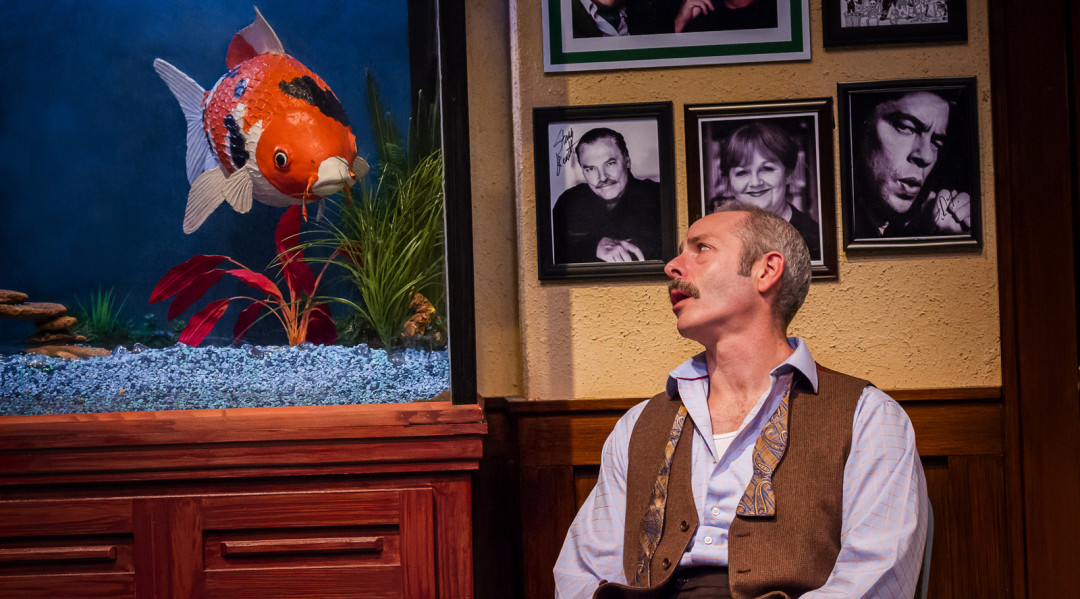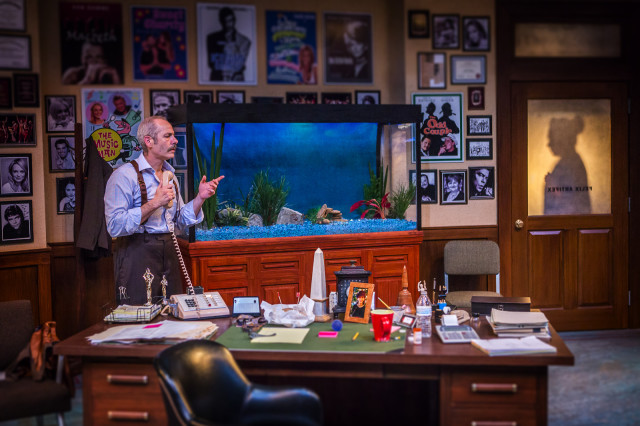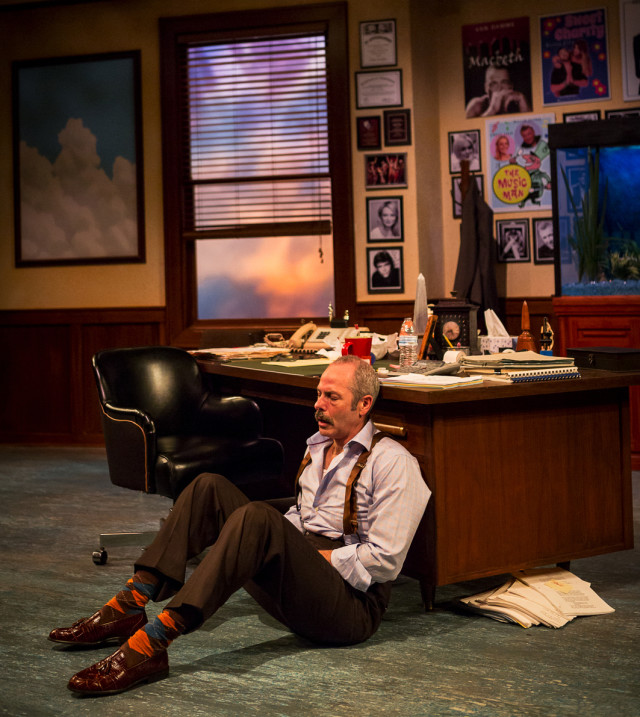Review + Q&A: ‘Mistakes Were Made’ & Craig Wright

Michael Mendelson as Felix Artifex talks with his only confidante, the overfed fish Denise.
Image: Owen Carey
Craig Wright’s Mistakes Were Made is a delightfully absurd spiral into theatrical hell, as second-rate theater producer Felix Artifex does everything possible to ensure his big break—a star-studded production about the French Revolution by an unknown Midwest writer—makes it to Broadway. True to the title, though, his mishandling of the situation quickly immolates his 12 phone lines with every problem imaginable (and some not, such as his get-rich-quick “sheep dipping” operation in the Middle East getting hijacked by flame thrower–wielding terrorists).
The show is effectively a monologue, its plot strung between Felix’s phone calls and conversations with his only confidante, an obese gold fish named Denise. Artists Rep favorite Todd Van Voris was slated to star but had to pull out one week before opening weekend due to family emergency, leaving director Michael Mendelson in a theatrical crisis of his own: instead of just making his Artists Rep directorial debut, he now had to memorize a 90-minute monologue in a matter of days.
Felix Artifex is the kind of smarmy huckster who lies to your face and then ends the phone call with “Thank you for being you.” His grasp of language is that of a poet who’s fallen out of step with reality, flinging out metaphors and witticisms that are fabulous conflagrations of verbal nonsense. Mendelson, who runs the Portland Shakespeare Project, is more than up to the delicious bluster and verbosity of Wright’s script, although on opening weekend, he didn’t quite own Felix’s smarminess (and his accent felt neither here nor there). While he’s at his best when he’s most unhinged, it’s his ability to portray Felix’s vulnerability that breathes the most sympathetic life into the character.
Mistakes Were Made
Artists Repertory Theatre
Thru Oct 27
Constructing an entire narrative out of only one end of multiple conversations is no easy task, particularly with a slimy anti-hero we all suspect we’ve seen before. Although the play was crowned the best of the year by both Time and New York magazines and should delight most lovers of words, many consider it one of Wright’s weaker scripts. Beyond a number of critically acclaimed plays, Craig Wright has also written episodes for Lost and Six Feet Under, as well as created the TV series Dirty Sexy Money. I got him on the phone to ask what led him to imagine this character, whose name means “lucky actor” or “happy creator,” in the first place, as well as the difference between writing for theater and television.
Culturephile: Your caller ID says Fox? Are you working on a project for them?
Craig Wright: I have an office here. I’m working on a show for FX called Tyrant. The show is being produced by Fox 21.
The theater producer trope is about as well worn as an old suit. Why choose it for this play?
A lot of my work has tended to use tropes that are familiar, or hackneyed, and then I fill them up with hopefully different material.
It took me a while, but I realized Mistakes Were Made was about myself at like 42 dealing with myself at like 22. The argument in the play between the producer and the writer is an argument I’m having in my own head. The producer asks the writer to change too much and the writer creates a giant problem, and in the end the producer learns his lesson and says, “I was wrong.”
I think the reason I wrote the play was I was trying to have that discussion with myself about what are the limits of artistic compromise. What felt interesting to me was being on the producer’s side. There’s a moment in the play where he says something like, “why can’t anyone ever just say yes.” I really feel for Felix. For producers, especially in Hollywood, there’re many ways up shit creek. They’re only as good as the material, and they can’t make the material; they can only purchase it or advise. They’re really f^*!ked. And yet they’re creative beings who want to contribute.
There’s a line, let me look for it…
I think I have it written down: "No, I am not mentally ill, Steven. I am imaginative, hopeful, and driven.”
That’s it. I agree with him. A lot of my plays are about a search for what to affirm in the apparently unaffirmable. There’s the theater producer trope as that evil dude, the bad guy, but I’m like, “hold on.”
So this is a conversation between your current, practical self and your younger, idealistic one. Did you find resolution?
The play definitely worked itself out. Which is to say, you can’t ever stop hearing that little voice of that young person who saw the world and wanted to create. You can’t lose sight of that, or there’s nothing to say—no reason to do the work. I feel like the play was a bit of a reminder for me.

Image: Owen Carey
Did you consider making him a TV or movie producer?
I like theater. There’s a puppet, a fish puppet, in the play, so he has to be a theater producer. The play is about theater. I really love Felix’s speech about why he wanted to do what he did, and it has to do with that live performance of the puppet theater he saw as a child, and he says, “that is all I ever wanted to do: to put on a show.” That’s what I love about theater, it’s so obviously pretend, but it’s also a coded message about something.
Which is something New York Times critic Charles Isherwood didn’t seem to get when he reviewed the play. He wanted verisimilitude.
The play has nothing to do with that.
Which is what allows it to be so beautifully absurd. Is any of it drawn from your own experiences as a producer?
Not a lot of the real facts of the piece, but definitely the structure of the dilemmas: how you promise one thing to one person and then another says they can’t ever do that, so you find a middle ground.
The way I talk about writing is to talk about a talking box. I have a talking box in my head. Felix Aritifex speaks in my head.
I had a character in one of my first plays, Molly’s Delicious, and he’s explaining to somebody an idea about sending surplus apples to the moon for the astronauts. He was talking about all the dangers they might encounter, and one of the things he says is: “what if the moon moves. It happened once.” What does that mean? You can’t make that up. It just happened.
Felix is like that times a thousand. I couldn’t make it up. Felix just says it. I know that sound disingenuous, but it’s true. Felix Artifex exists for me as another individual. Growing up I always detested writers who talked about their characters as if they were other, but I was daunted by the notion of surrendering. As I get older, I hope, please surrender.
So he’s speaking in your head, but then you have to make him fit the artifice of the theater. How did you confront the struggle of creating a show from a one-sided conversation?
There’s a simple problem with every line: making sure you understand what the person said on the other end. You really couldn’t do it any other way, because the situation is so false. If you went into another P.O.V., it would be like, “what, hang up on that guy.”
There was a time when the play was much more cosmic and mystical. I thought of Felix as God trying to make something happen and then running into difficulties. Little by little the play got earth bound. I remember when I first imagined it, one of the components in my mind was there were bombs going off outside in the streets, and he didn’t understand he was making them happen by pressing buttons on the phone. In essence, the play is still that story: he’s creating the problems.

Image: Owen Carey
And yet the most powerful moments come after everything has fallen apart and we see Felix at his most human, his most vulnerable. Did you know from the start that you’d need Felix’s own mistake in his very personal life?
I have a fancy answer to that that you probably won't want to publish. Carl Jung wrote a book called Answer to Job, where he said that at the end of the Old Testament, Job looks at God—we all know the Bible didn’t happen, it’s all human authors creating human characters—and is like, “how come you make me suffer so much?” And God doesn’t answer. Carl Jung says that Jesus dying on the cross is the answer to Job. God suffers to settle the account. So yeah, even if you imagined for a minute that there’s some sort of deistic metaphor, yes, he comes down to earth and suffers the most.
When he’s pitching the story about the little girl who hits her head by the fountain—it’s how his daughter died because he wasn’t looking.
I was a little confused about that. I knew he lost a child, but I didn’t realize that was his story. How funny, Third Rail’s production right now, Sweet and Sad, is also about the responsibility of the parent in the loss of a child.
To change topic shortly, I know you get asked this a lot, but you’ve also written for a number of very successful TV shows. What’s different between it and the stage?
Hold on…I have to get my gun so I can shoot myself in the head.
At the risk of giving an answer I’ve given before, I believe that theater is an existential art form and television is a psychological art form. The questions of television are: why do people do what they do? Whereas for me question for theater is: what are we doing here? We exist.
What really stinks for me are a lot of plays are about why do we do what we do, as opposed to the stuckness of finding ourselves alive. I have a really hard time understanding why anyone would do a play that doesn’t have a little suspension of disbelief. If you can only get that drug in one place, why wouldn’t you take it?
Do you gravitate to the psychological or the existential more?
Certainly to the existential. There’s an energy a lot of television shows have where they want to make you feel like this is happening, and I find it offensive. I never thought Twin Peaks was really happening, but I sure rushed home to see it.
So you’re coming out to Portland to see the production. You came out in 2007 for Third Rail’s staging of Grace. Do you try to make it to all the productions of your plays, or is something special, here?
No. I like Portland. And I like the people in the theaters that I’ve worked with there. Lots of times my plays are done, and I don’t see them. I wrote very fondly of Portland in a play Third Rail did called The Gray Sisters, and it took place there.
And I believe you’ve worked with Damaso [Rodriguez, Artists Rep’s artistic director] when he was at Furious Theater in LA before?
He did a production of Grace here in LA that won all sorts of awards. That cemented our friendship.
When did you hear about Todd, the lead, having to step out a week before the show? Did it somehow seem a perfect real life turn for the play?
I took it in stride. I didn’t know the actor. It didn’t change much for me. It fills me with more sympathy for the director who’s performing it. It’s a lot of words.
I would love to hear his thoughts about the karmic payback of having to execute your own direction. Having to perform the piece you intended for someone else forces you to realize things like, that doesn’t work here. God help any of us who have to travel to the moon in the spaceship we designed.




